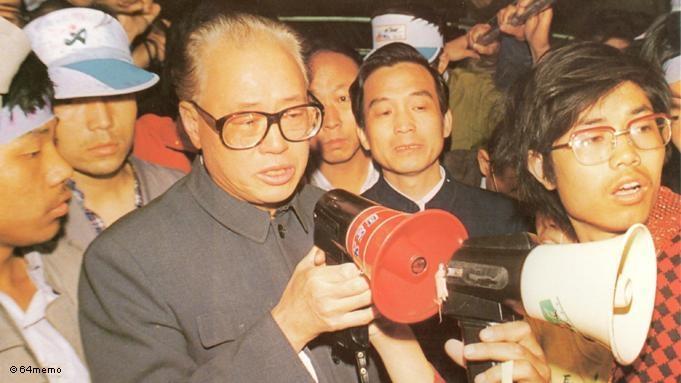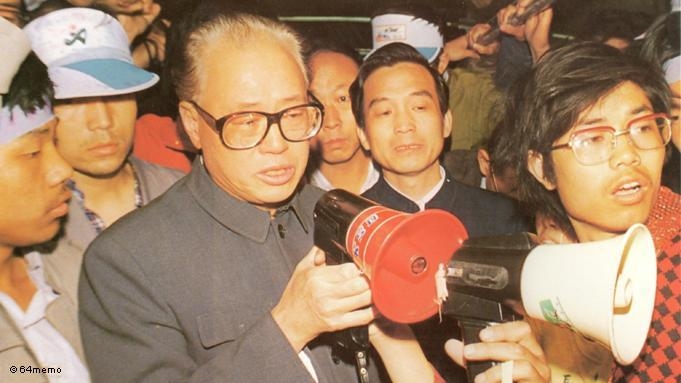Eight years after the death of Zhao Ziyang, the former Chinese premier and General Secretary of the Communist Party who resigned after the Tiananmen Square massacre, hundreds of mourners flocked to his house to pay their respects.
This year, in stark contrast to years past, authorities didn’t try to stop the mourners.
On the early morning of Jan. 17, mourners from all walks of life who came to pay their respects swarmed to No. 6 Fuqiang Alley in Beijing, the house of Zhao Ziyang at the time of his death.
There have been police cars and guards on duty outside the residence, but visitors were not stopped.
“This year, I directly feel more people coming, apparently more, the yard crowded with visitors,” said Wang Zhihua, husband of Zhao’s daughter Wang Yannan, to Voice of America.
Li Huanjun, a human rights activist in Beijing, agreed, adding that, “a crowd of them left, immediately followed by another crowd. I estimated there were hundreds of them; many of them had left before my arrival.”
Remembered for Sense of Humanity
Among this year’s mourners was Hu Jia, a democracy activist who was sentenced to three and half years in jail in April 2008. He was charged with “subverting state power,” a vague charge that is roughly equivalent to what used to be called “counterrevolutionary activity.” Hu stayed under house arrest for two years after his release from jail. This was his first visit to Zhao’s house in five years.
Hu said Zhao chose human nature over “Party nature” at the critical moment, aware of the price he would pay, in reference to Zhao’s attempts to head off the massacre of students in 1989.
Hu said he deeply admired Zhao for his courage. Though current leaders are not directly responsible for the Tiananmen massacre, they still belong to a privileged class, said Hu. He doesn’t think the privileged leaders will have the wisdom and courage to change the reality of one-party dictatorship in China.
He said, “We can’t wait. We must do it.”
There is no hope for reform from above, in his opinion. “Change is never granted by the Communist Party. It’s all about how many rise up, how many awaken to the dictatorship and fight back,” Hu said.
Bao Tong, Zhao’s policy secretary who is still under house arrest, said though he is unable to pay his respects to Zhao in person, he never forgets the anniversary.
Bao said Zhao was different from others because he treated human beings as human beings. Other party leaders treated humans as tools, puppets, labor, or military forces. As for resolving or redressing the Tiananmen massacre, he said, it’s not just the responsibility of Party leaders, but is the responsibility of every Chinese person.
Jiang Blocked Funeral
After Zhao’s death on Jan. 17, 2005, party officials consulted their superiors about Zhao’s funeral.
Leaders, like National People’s Congress Chairman Wan Li, Qiao Shi, and Tian Jiyun, vice chair of the Standing Committee of the National People’s Congress, asked the central leadership to hold a state funeral for Zhao Ziyang appropriate to his rank, according to Di Suo, wife of Hu Jiwei, the former president of People’s Daily. The central leadership wanted to hold a formal funeral for Zhao, but former party head Jiang Zemin opposed it.
Under pressure, Party head Hu Jintao and premier Wen Jiabao gave up on honoring Zhao.
Jiang feared the June 4 event would be reevaluated.
Jiang and Li Peng, who was nicknamed the “butcher of Beijing,” made the decisions for June 4 1989.
After the Tiananmen Papers were published, Jiang and Li forced every member of the Politburo to take a stance on the June 4 event, and to pass a resolution that promised that the June 4 event would never be re-judged.
In the period following the massacre Jiang, hands covered with the blood of the Tiananmen students, rose from Shanghai Party boss to the highest level of power in the regime.
The Epoch Times publishes in 35 countries and in 21 languages. Subscribe to our e-newsletter.




